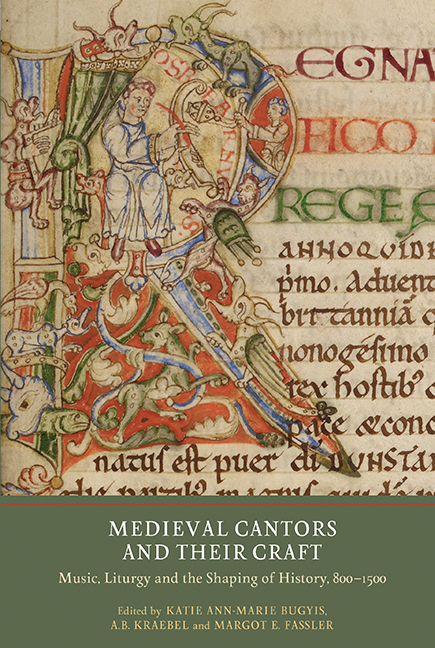Book contents
- Frontmatter
- Dedication
- Contents
- List of Illustrations
- Contributors
- Acknowledgments
- Abbreviations
- Miscellaneous Frontmatter
- Introduction
- PART I The Carolingian Period
- PART II The Eleventh Century
- 5 Adémar de Chabannes (989–1034) as Musicologist
- 6 Cantor or Canonicus? In Search of Musicians and Liturgists in Eleventh-Century Constance
- 7 Shaping the Historical Dunstan: Many Lives and a Musical Office
- 8 Female Monastic Cantors and Sacristans in Central Medieval England: Four Sketches
- PART III England in the Twelfth Century
- PART IV On the Continent: Five Case Studies
- Index of Manuscripts
- General Index
- Miscellaneous Endmatter
5 - Adémar de Chabannes (989–1034) as Musicologist
from PART II - The Eleventh Century
Published online by Cambridge University Press: 25 October 2017
- Frontmatter
- Dedication
- Contents
- List of Illustrations
- Contributors
- Acknowledgments
- Abbreviations
- Miscellaneous Frontmatter
- Introduction
- PART I The Carolingian Period
- PART II The Eleventh Century
- 5 Adémar de Chabannes (989–1034) as Musicologist
- 6 Cantor or Canonicus? In Search of Musicians and Liturgists in Eleventh-Century Constance
- 7 Shaping the Historical Dunstan: Many Lives and a Musical Office
- 8 Female Monastic Cantors and Sacristans in Central Medieval England: Four Sketches
- PART III England in the Twelfth Century
- PART IV On the Continent: Five Case Studies
- Index of Manuscripts
- General Index
- Miscellaneous Endmatter
Summary
Today, Adémar de Chabannes, monk of the abbey of St Cybard in Angouleme during the early eleventh century, is famous for two things: he was the most respected historian of his day in Aquitaine and he advocated the apostolicity of St Martial, patron saint of the abbey that bears his name in Limoges, where Adémar, due to his strong family connections, spent a good deal of time over the early decades of the eleventh century. These accomplishments are well known to modern scholarship principally through the work of Richard Landes, Daniel Callahan and Pascale Bourgain. The third book of Adémar's Chronicon remains an essential primary source for Aquitanian history of the tenth and early eleventh centuries, and historians continue to mine his sermons for information about the abbey of St Martial. A third area of endeavour has more recently attracted attention, namely Adémar's contributions to the musical community at St Martial during his sojourns there, the subject of my own research.
Adémar emerges from his writings as a knowledgeable and sophisticated historian, intimately familiar with texts that remain central primary sources for the history of the early Middle Ages, including Gregory of Tours, the Gesta regum Francorum (which he used as the source of Book I of his Chronicon), the Royal Frankish Annals and the Liber pontificalis. Moreover, his historical writing contains a host of references to musical practices in Aquitaine and elsewhere that unequivocally demonstrate his detailed knowledge of the art. He bases the second book of his Chronicon on the Royal Frankish Annals, into which he interpolated a narrative of the debate between the Frankish and papal cantors that occurred in Rome during Charlemagne's visit to the papal curia of Adrian I at Easter 787. He in turn borrows this narrative from the biography of Gregory the Great written in Rome by John the Deacon between 873 and 875. Adémar sharpens the historical details of John's account by correcting him – John, for example, states that Adrian was not yet pope when Charlemagne first visited Rome in 774, but Adémar knew better from a comparison of the Liber pontificalis, which he had just edited for Bishop Roho of Angouleme, with the Royal Frankish Annals, the source of his Book II – and by placing the debate in the context of the Frankish reform of chant, the motivation for which Adémar attributes to this incident.
- Type
- Chapter
- Information
- Medieval Cantors and their CraftMusic, Liturgy and the Shaping of History, 800-1500, pp. 90 - 102Publisher: Boydell & BrewerPrint publication year: 2017



